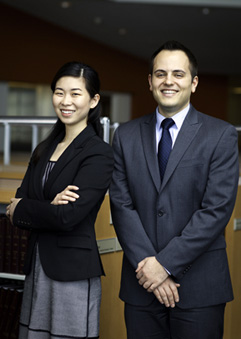 Penn State Law students Rachel Keung ’13 and Daniel DeCurtis ’12 traveled the distance to the Clinton County Correctional facility from their office at the Law School’s Center for Immigrants’ Rights in less than an hour. But representing their client, the American Bar Association’s (ABA) Commission on Immigration, required entering the complex world of immigrant detention which was “quite a journey,” according to Keung who said she had never been in a prison before.
Penn State Law students Rachel Keung ’13 and Daniel DeCurtis ’12 traveled the distance to the Clinton County Correctional facility from their office at the Law School’s Center for Immigrants’ Rights in less than an hour. But representing their client, the American Bar Association’s (ABA) Commission on Immigration, required entering the complex world of immigrant detention which was “quite a journey,” according to Keung who said she had never been in a prison before.
The students were charged with observing the treatment of the detainees at the immigration detention facility at Clinton County Jail. They then analyzed their results and prepared a report concerning the implementation of the U.S. Immigration and Customs Enforcement (ICE) detention standards at the facility as part of a more comprehensive analysis that will be completed by the ABA. In the ten year history of this project, Penn State Law is only the second law school to serve in this capacity which is a responsibility traditionally provided as a pro bono service by law firms. The mission is to ensure fair treatment and due process rights for immigrants and refugees within the U.S.
“We went in and observed things like whether the detainees have legal access. This included access to phones, computers, and a law library. These communication tools are especially important in a rural area where detainees are not likely to have visitors … and also because approximately 84% of all detainees are not represented by counsel,” Keung said. The student also reviewed processes, such as medical care and mail handling.
Students conducted interviews in prison
DeCurtis pointed out that the federal government pays state and local governments to house detainees who are typically held while awaiting removal or deportation proceedings. While ICE issues guidelines for the treatment of detainees, they are not hard and fast regulations, “so it is important to evaluate the extent to which the standards are being implemented,” he said. In addition to observation, the students also interviewed prison/ICE personnel and detainees separately.
“Although we focused on this one facility and did not directly represent the detainees, I hope our work serves to represent detainees’ interests and brings about changes that would improve overall standards of care,” DeCurtis said. He joined Penn State Law in part because of the opportunity to work in the clinic under the direction of Professor
Shoba Sivaprasad Wadhia, who accompanied the students during the interviews.
Prior to and throughout law school, DeCurtis has worked for
Fragomen, Del Rey, Bernsen & Loewy in New York one of the world’s largest immigration firms. “While corporate immigration is my primary area of interest, and I plan to continue my work in that area, the clinic gave me the opportunity to experience the policy side of immigration.”
As the daughter of immigrants, Keung has a personal as well as professional interest in immigration law. “My mother especially faced the complexity of the U.S. immigration system,” she said. “So this work has really inspired me. It made me see how many people there are that need representation but probably won’t get it. It demonstrated the world does need another lawyer.”
Marathon training
Because the students had one shot of going to prison to collect data, they described their training as "marathon-like." According to DeCurtis, "we spent several weeks revising and refining three different questionnaires — one for our observations, one with questions to ask the facility and ICE staff, and one for our one-on-one interviews with the detainees. These questionnaires had to address all of the relevant issues we were there to observe, as well as provide for follow-up questions, contingencies, and clarifications depending on how a preceding question was answered."
Professor Wadhia also held a mock interview session with students in the Center for Immigrants' Rights, where students were assigned different roles (ie. prison staff, ICE official, detainee). “Rachel and I found this experience invaluable. Our colleagues did an outstanding job staying in character and throwing us curve ball answers, so we were able to gauge our areas of strength and weakness. Everyone also provided us with feedback and constructive criticism afterward.”
The students also toured York County Prison and met with the
Pennsylvania Immigration Resource Center (PIRC) in York, Pennsylvania. PIRC provided the students with information about techniques for interviewing detained immigrants, as well.
The students anticipate presenting the key findings from the report and experiences from their visit to Clinton County Correctional Facility to the ABA Commission on Immigration in Washington D.C. later this month.
 Penn State Law students Rachel Keung ’13 and Daniel DeCurtis ’12 traveled the distance to the Clinton County Correctional facility from their office at the Law School’s Center for Immigrants’ Rights in less than an hour. But representing their client, the American Bar Association’s (ABA) Commission on Immigration, required entering the complex world of immigrant detention which was “quite a journey,” according to Keung who said she had never been in a prison before.
Penn State Law students Rachel Keung ’13 and Daniel DeCurtis ’12 traveled the distance to the Clinton County Correctional facility from their office at the Law School’s Center for Immigrants’ Rights in less than an hour. But representing their client, the American Bar Association’s (ABA) Commission on Immigration, required entering the complex world of immigrant detention which was “quite a journey,” according to Keung who said she had never been in a prison before.